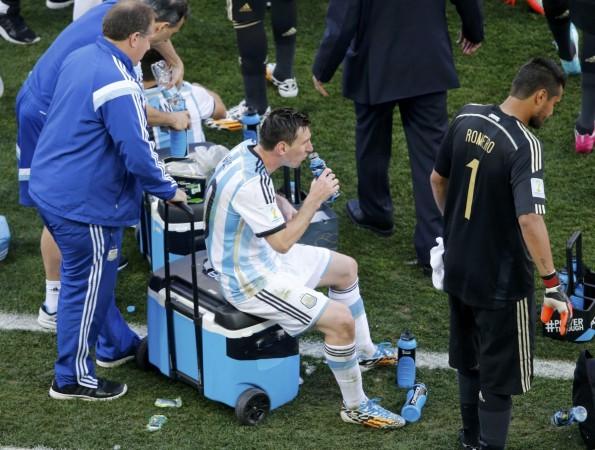
Argentina and Germany should dispose of their 'energy drinks' during half time of the FIFA World Cup final later tonight, according to a study done in Australia.
It is a commonly known fact that most of the goals scored in football come after half time. This phenomenon has mainly been attributed to the fact that as the match nears the 90-minute mark, the players get tired and often fail to keep the defensive structure that is so meticulously devised by the managers.
Over the past few years, teams all over the world have started providing their players with isotonic 'energy drinks', both during the matches and also during half time.
However, according to ABC Science, a recent study by the La Trobe University, which was published in the Journal of Athletic Training, revealed that these isotonic drinks have absolutely no positive effect on the performance of the players after half time.
In this study, 10 academy level male football players from a Barclays Premier League club were given a carbohydrate-electrolyte drink, two hours before the kick-off, during half-time, and at 15 minute intervals during the match. Some of these players were, however, given a placebo solution of the same dosage. The researchers took blood samples from these players before kick-off, 10 minutes into half time, and at an interval of every 15 minutes.
According to the researchers, the glucose-carbohydrate concentration found in the blood of the energy-drink-group was found to be highest during the 30-45 minute mark. However, contrary to common belief, half time and any energy drink taken during this period causes the glucose-carbohydrate concentration in the blood to drop by around 30 percent, in both the groups.
Also, throughout the second half of the match both groups maintained more-or-less similar levels of glucose-carbohydrate concentration, which rises again, during the last 10 minutes of regulation time.
Hence, this proves that the 'energy drinks' that the players constantly take during the match, at half time and after the match do not have any special effect on the performance of the players. Rather it tends to drain the glucose from the blood, and into muscle tissues and liver tissues.
"Our brain requires glucose to function but it doesn't store carbohydrates," said Michael Kingsley, Associate Professor at La Trobe University, who is leading this particular research. "Therefore, it relies on a continuous supply of glucose from the blood. This (reduction in blood glucose) might have an influence on the player decision-making".
He also says that this is not a desired effect in a sport like football, where the players need to take decisions right through the 90 minutes, and maybe even extra time and penalties.
Kingsley even says that half time in football should be revised. Meanwhile, he and his team of researchers are trying to develop an energy drink with a different type of solution, and a different interval period for drinking it, for the athletes, which could increase the player's performance exponentially.

















